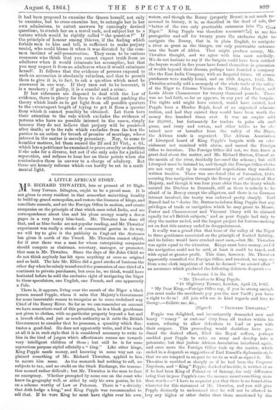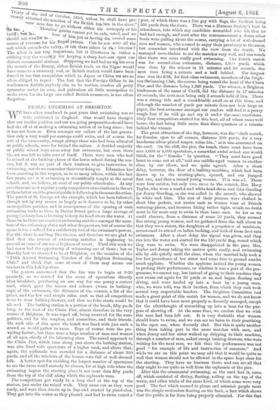A LITTLE AFRICAN STORY.
1VIR. RICHARD THWAITES, late or present of 10 High- bury Terrace, Islington, ought to be a proud man. It is not given to every resident in that somewhat uninviting locality to buildup grand monopolies, and restore the finances of kings, and conciliate consuls, and set the Foreign Office in motion, and create companies on the principle of that which once ruled India, and see correspondence about him and his plans occupy nearly a dozen pages in a very heavy blue-book. Mr. Thwaites has done all that, and as blue-books are not popular reading, and Mr. Thwaites' experiment was really a stroke of commercial genius in its way, we will try to give it the publicity in England the Scotsman has given it north of the Tweed. Mr. Thwaites cannot object, for if ever there was a man for whom enterprising companies should compete as chairman, secretary, manager, or promoter, that man is Mr. Thwaites. Since the days of Sir John Child we do not think anybody has hit upon anything at once so original and so bold. The late Mr. Ellice did a good stroke of business the other day when he calmly transferred the possession of one-third of a continent to private purchasers, but even he, we think, would have hesitated before he sold the exclusive tight of navigating the Niger to three speculators, one English, one French, and one apparently a Pole.
There is, it appears, living near the mouth of the Niger a black person named Pepple, whom it suits Her Majesty's Government for some inscrutable reason to recognize as in some undefined way Chief of the Bonny River. So far as we can remember an account we have somewhere read of this potentate, he is a black gentleman not given to clothes, with no particular property beyond a hut and a breech cloth, and just as much authority as it suits the British Government to consider that he possesses, a quantity which fluc- tuates a good deal. He does not apparently write, and if Ile reads at all it is in such style that it is considered necessary to write to him in the kind of jargon which affectionate nurses use towards very - intelligent children of three ; but still he is for some mysterious purpose styled officially a" king." Like other kings, King Pepple needs money, and knowing in some way not ex-
plained something of Mr. Richard Thwaites, applied to him to secure him some. As the monarch had nothing to sell, no subjects to tax, and no credit on the Stock Exchange, the transac- tion seemed rather difficult ; but Mr. Thwaites is the man to face! an emergency. Whether prompted by some one on the coast who I knew its geography well, or aided by only his own genius, he hit on a scheme worthy of Law or Paterson. There is "a divinity that doth hedge a king," and King Pepple was recommended to sell that. If he were King he must have rights over his own i waters, and though the Bonny (properly Benue) is not much re-- nowned in history, it is, as described in the deed of seal tbsr "better of the two only practicable entrances iiit ti.e it; Niger." King Pepple was therefore recommelel to use aka prerogative and sell for twenty years the exclusive right to. navigate the Bonny, that is, in plain English, to navigate , a river as great as the Ganges, our only practicable entrance into the heart of Africa. That might produce money, Mr.. Thwaites thought, and we agree with him most cordially. We do not hesitate to say if the bargain could have been ratified' the buyers would in five years have found themselves in possession of wealth beyond their dreams, perhaps have founded a company- like the East India Company, with an Imperial future. Of course purchasers were readily found, and on 16th August, 1832, Mr. Thwaites actually sold a monopoly of the whole trade of the valley' of the Niger to Etienne Vicoutte de Thury, John Foster, and. Louis Alexis Chamerovzov for twenty thousand pounds. There was no bad faith, so far as appears, in any part of the bargain. The rights sold might have existed, would have existed, had Pepple been a Hindoo Rajah, head of an organized adminis- tration, and had they existed they would have been worth the'- money five hundred times over. It was an empire sold for 20,000/., but fortunately for traders in palm oils malt gums, and ivory and cotton, and other trifles to be ob- tained now or hereafter from the valley of the Niger, the African trade is organized. '1'lle African Associatiea of Liverpool heard of King Pepple's bargain with an 'asto- nishment not unmixed with alarm, and moved the Foreign Office to interfere. The Foreign Office did not, we fear, know a great deal about the matter, and Mr. Richard Burton, Consul at the mouth of the river, decidedly favoured "the scheme ; but still, Liverpool must be listened to, and though the Foreign.Office clerks. are not very well up in commercial negotiations they recollect written treaties. There was one dated 21st of November, War securing free navigation through the Bonny to all subjects of Iler Majesty, and though it was four years older than the treaty which- secured the Duchies to Denmark, still as there is nobody to be' afraid of in Bonny except the alligators, and there is no German interest involved, the treaty was enforced pretty sharply. Earl Russell had to "desire Mr. Burton to inform King Pepple that any privileges of trade or navigation which he may grant to Messrs. Foster and Channerovzov and Viscount Thury will be claimed equally for &I British subjects," and as poor Pepple had only to obey the matter ended, and the largest project for fortune-making set on foot this century ended in disappointment.
It really was a grand idea that lease of the valley of the Niger to three gentlemen associated on the principle of limited liability, and its failure would have crushed most inen,—but Mr. Thwaites was again equal to the situation. Kings must have money, awl if the navigation could not be sold, at least it could be taxed, and. with equal or greater profit. This time, however, Mr. Thwai:es apparently consulted the Foreign Office, and received, we septa se, from some clerk impatient of what he deemed "an absurd affair" an assurance which produced the following delicious despatch :—
" Inclosure 3 in No. 36.
"Mr. Thwaites to King Pepple.
"10 II ighbury Terrace, London, April 22, 1863.
"My Dear King,—Foreigu Office say, if you be strong enough you must make the merchants pay you the new Tariff; you have a right to do so ! All join with me in kind regards and love to George.—Believe me, &c.,
(Signed) " RICIIARD THAVAITES."
Pepple was delighted, and incontinently demanded new and heavy " coiney " or customs' duty from all traders within his waters, refusing to allow defaulters to load or pass with their cargoes. This proceeding would doubtless have pro- duced the desired effect, filled the Royal coffers, perhaps- enabled poor Pepple to raise an army and develop into a potentate; but that jealous African Association interfered again,. and once more the Foreign Office took up the matter, which ended in a despatch so suggestive of Earl Russell's diplomatic style that we are tempted to suspect he wrote as well as signe.1 it. Mr.. Thwaites is snubbed as sharply as if he had been the Emperor Napoleon, and "King" Pepple, decked of his title, is written at as, he had been King of Poland or of Saxony, time only difference being that in poor Pepple's case the menace meant something more than words :—" I have to acquaint you that there is no foundation whatever for this statement of Mr. Thwaites, and you will give Pepple distinctly to understand that he will not be allowed to levy any higher or other- duties than those sanctioned by the Treaty of have pre-
viously 3rd° f October, 1850, unles he shall obtained the
sanction of the B "
s
' boor than
go with.( o to relitaahther thisrikiers in the river."
fSe tab -.-awaf ,
tes geniUs Cannot yet monopoly or his be eafunsted, and we
tariff ; but hear of him yet as having dia ,overed some should not wonder .
• source of revenue for hist Koala patron. Can he not .seize all the salt which aseenditilie valley, or are there mines in tit. a interior 9 The affair is not l'ary imperrtant, but it illustrates in' rather a striking way the neceattiaY , for aping a sharp look-out -upon our distant commercial atatione. c$upposing we had had no rig hts over the mouth of the Bonny, either British trade on the Niger would have come to a summary end, or British traders would have been forced to use that compulsion which in japan or China we are so often obliged to regret. The feet that the Foreign Office in its restlessness forbids anybody else to be restless, crushes all petty tyrannies under its own, and pulverizes all little monopolies to make room for the large one called British commerce, is too often forgotten.































 Previous page
Previous page